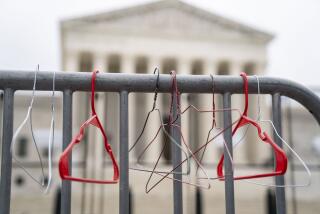Senate OKs Long-Delayed Appeals Court Nomination
WASHINGTON — A divided Senate on Tuesday approved 55 to 44 President Bush’s long-delayed appellate court nomination of U.S. District Judge Dennis W. Shedd, a protege of retiring Sen. Strom Thurmond (R-S.C.).
Shedd’s appointment was bitterly opposed by civil rights and women’s groups, who accused the 49-year-old South Carolina judge of siding mainly with employers in discrimination suits.
But Shedd’s supporters accused the judge’s critics of ignoring the message from the election earlier this month that will give Republicans control of both houses of Congress in January.
“The election showed that Americans trust this president, including in his selection of judicial nominees,” said Sen. Orrin G. Hatch (R-Utah), who will become chairman of the Judiciary Committee when the 108th Congress convenes.
In support of Shedd’s nomination, Thurmond -- who turns 100 on Dec. 5 and came to the Senate in 1954 -- delivered his last speech on the Senate floor, saying that the judge would “uphold the rights of all people.” He received a standing ovation.
While campaigning for GOP candidates this fall, Bush assailed the Democratic-led Senate for blocking qualified judicial nominees for political reasons, creating what he called a vacancy crisis on the federal bench. Democrats, in turn, have accused Bush of attempting to pack the bench with conservative ideologues.
Of 862 federal judgeships, 60 are vacant, according to the Justice Department. Shedd was among several of Bush’s judicial choices who have been waiting for a Senate vote since they were nominated on May 9, 2001. However, that is still less than the nearly four years that Judge Richard A. Paez of Los Angeles, a nominee of President Clinton to the 9th Circuit Court of Appeals, waited before he won confirmation two years ago.
Democrats say they have confirmed 100 judicial nominees since taking over the Senate. But Republicans say Bush’s choices have encountered more resistance than those in previous administrations.
Analysts said Shedd, a former aide to Thurmond and a former chief counsel to the Judiciary Committee, won approval because Democrats are picking their battles more carefully.
“This would not appear to be the appointment with which to draw some line in the sand and make a fight,” said Elliot Slotnick, a political science professor at Ohio State University. “Those fights might come -- certainly over some prospective Supreme Court nominees should a vacancy arise.”
Larry J. Sabato, a University of Virginia political scientist, said Bush was taking advantage of the stronger mandate he received Nov. 5.
“The Shedd confirmation is just the beginning of a flood of Bush court appointees we’re likely to see once the Republicans formally retake control of the Senate in January,” he said. “Democrats will filibuster a few, but their options are limited by political reality. They will have to pick and choose their filibusters carefully to avoid the image of obstructionism, which means most Bush judges will get to the bench.”
Federal district and appellate court judges have lifetime terms.
Battles are expected next year if the Senate moves ahead with plans to revive Bush’s nominations of U.S. District Judge Charles W. Pickering of Mississippi and Texas Supreme Court Justice Priscilla Owen, both nominated for the New Orleans-based 5th Circuit Court of Appeals. Both were rejected by the Senate Judiciary Committee as being too conservative.
Last month, Thurmond delivered a rare tongue-lashing on the Senate floor at Democrats for delaying a vote on his former aide.
Seven Democrats joined 48 Republicans in supporting Shedd’s elevation to the U.S. 4th Circuit Court of Appeals, which covers South Carolina, North Carolina, Maryland, Virginia and West Virginia.
Among them was South Carolina’s other senator, Democrat Ernest F. Hollings, who in June called Shedd “my kind of judge -- hard and tough, but hard and tough on both sides.”
Both California senators, Democrats Barbara Boxer and Dianne Feinstein, voted against the nomination.
Sen. Patrick J. Leahy (D-Vt.), chairman of the Senate Judiciary Committee, pointed to a 2-foot-high stack of letters from individuals and groups expressing concern about Shedd.
“His record as a whole raises serious concerns about whether he should be elevated to a court that is only one step below the U.S. Supreme Court,” Leahy said.
But Hatch accused Shedd’s detractors of distorting the judge’s record.
“The well-paid left-wing lobbyists who have turned attacking President Bush’s judicial nominees into a small cottage industry see only what they want to see and not what the truth would show them,” Hatch said.
More to Read
Get the L.A. Times Politics newsletter
Deeply reported insights into legislation, politics and policy from Sacramento, Washington and beyond. In your inbox three times per week.
You may occasionally receive promotional content from the Los Angeles Times.











